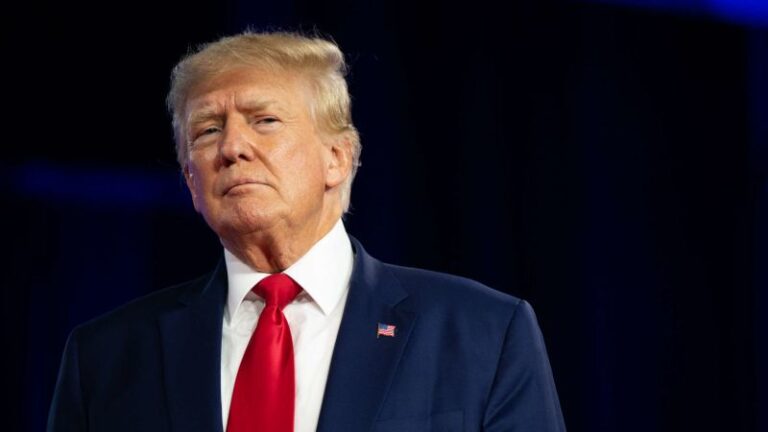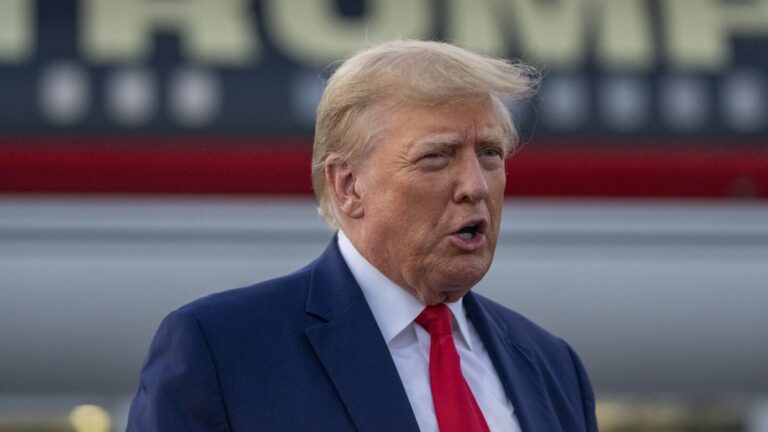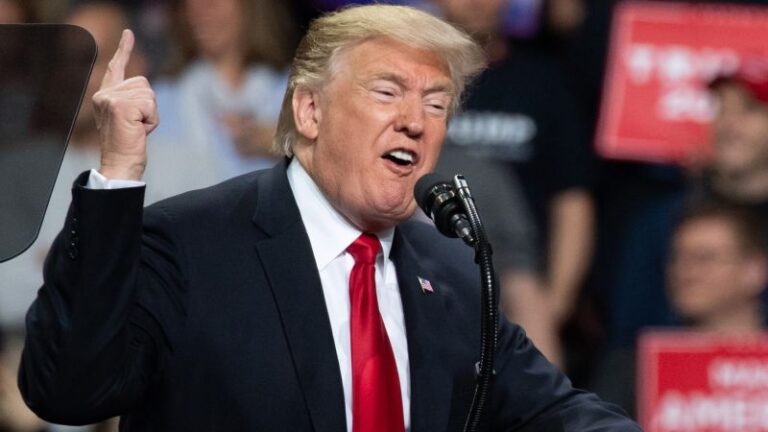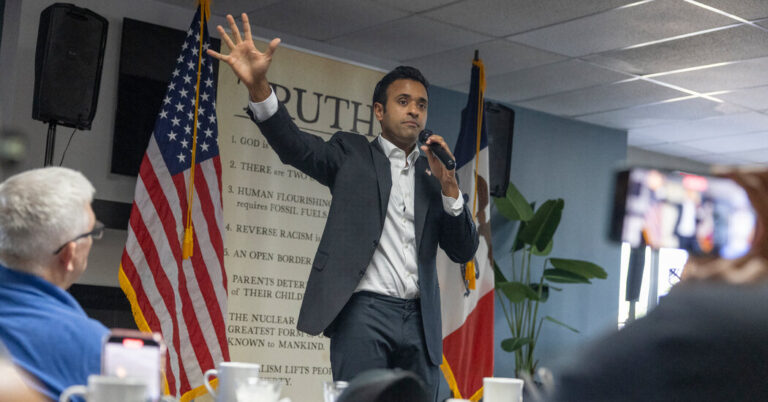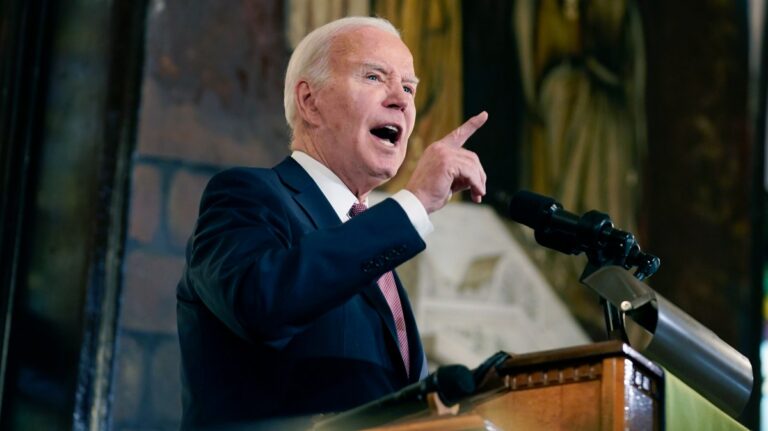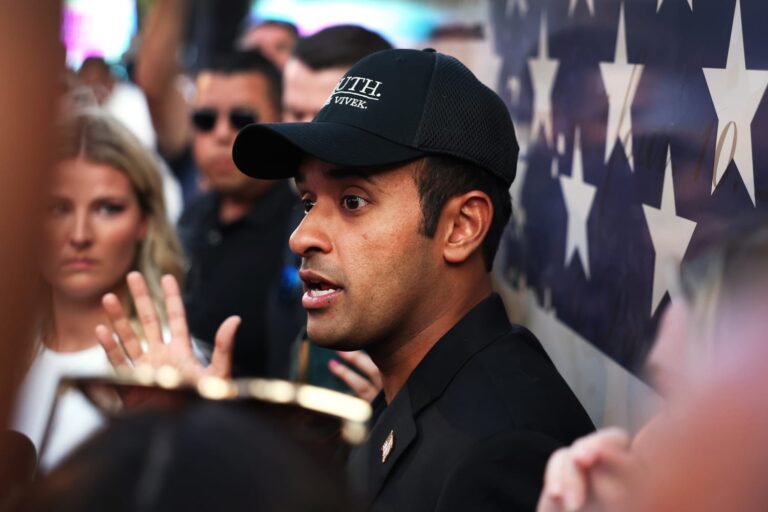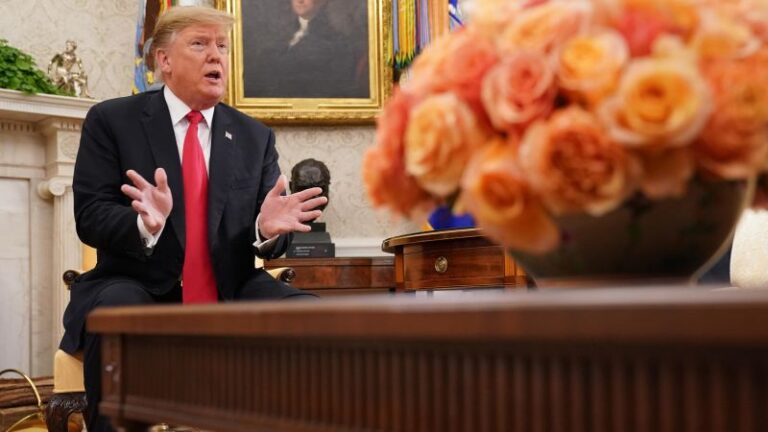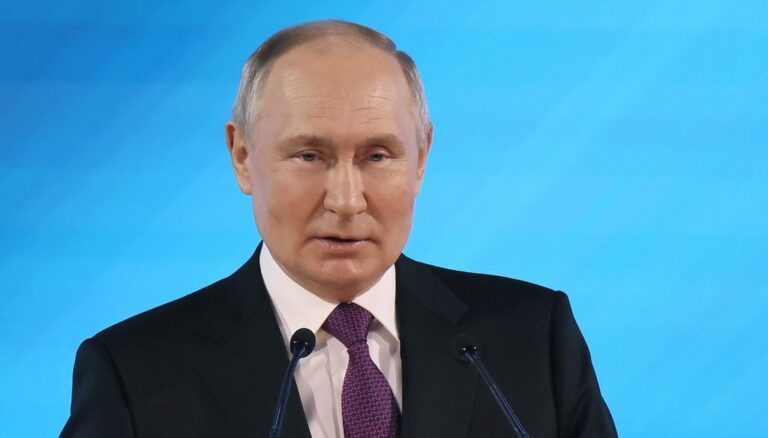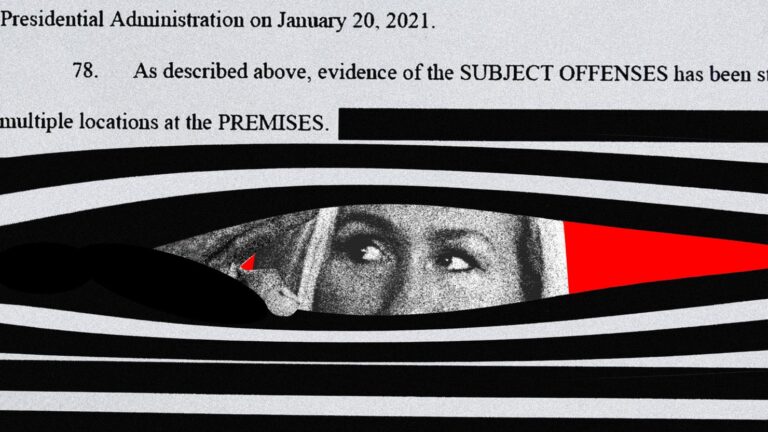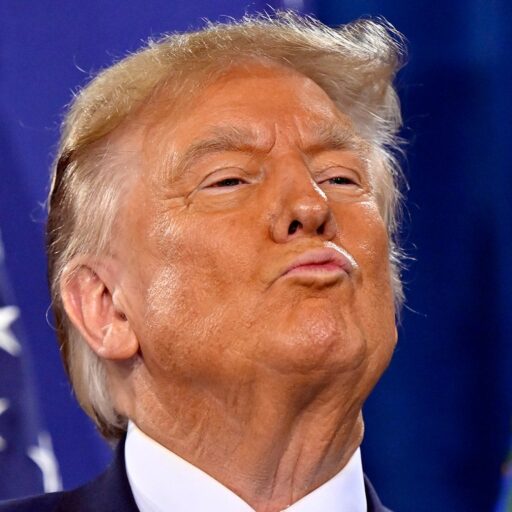Washington
CNN
—
A Georgia indictment of former President Donald Trump for his efforts to overturn the 2020 election lists at least 27 lies Trump told about the election – and that’s counting conservatively.
The new indictment, handed up Monday by a grand jury in Fulton County, Georgia, is the second indictment this month to function as a kind of prosecutorial fact check of the former president’s relentless campaign of election-related dishonesty. A federal indictment in early August, which also charged Trump for his efforts to subvert the will of the voters, listed 21 of his election lies.
There is significant overlap between the lies identified in the two indictments, but the Fulton County document lays out more of his false claims about Georgia in particular. Trump uttered many of those claims during a January 2, 2021 phone call with Georgia Secretary of State Brad Raffensperger in which he pressured Raffensperger to “find” enough votes to give him a victory in the state Joe Biden had won.
The Fulton County indictment – in which Trump was charged with making false statements to Raffensperger and in a court filing and engaging in a conspiracy to try to use phony pro-Trump electors, among other crimes – also lays out numerous lies from some of the 18 Trump allies who have been charged alongside him, notably including a large number of falsehoods from his former lawyer Rudy Giuliani. This article is specifically about lies attributed to Trump himself.
1. Trump’s lie that he was the real winner of the 2020 election. (Page 20 of the indictment)
This is Trump’s overarching lie about the election. He lost fair and square to Biden, 306-232 in the Electoral College, and there is no evidence of fraud even close to widespread enough to have altered the outcome in any state.
2. Trump’s lie that the 2020 election was “corrupt.” (Page 45)
The Fulton County indictment, like the federal election subversion indictment, alleges that on December 27, 2020, Trump said the following in a conversation with two senior Justice Department officials, acting attorney general Jeffrey Rosen and acting deputy attorney general Richard Donoghue: “Just say that the election was corrupt and leave the rest to me and the Republican congressmen.” (Donoghue memorialized this purported Trump remark in his handwritten notes.)
3. Trump’s lie that he won Georgia in 2020. (Pages 44 and 52)
Trump has repeated this lie even though the last of the state’s three vote counts, completed in early December 2020, showed that he lost to Biden by 11,779 votes – and though the state’s Republican governor and secretary of state certified the election and have steadfastly affirmed its legitimacy. The Fulton County indictment alleges that, in a December 23, 2020 call with the chief investigator for Raffensperger’s office, Trump falsely claimed that he had won Georgia “by hundreds of thousands of votes.” The indictment also notes that on the January 2, 2021 phone call with Raffensperger, Trump falsely said, “And the real truth is I won by 400,000 votes. At least.”
4. Trump’s lie that he “also won the other Swing States” in 2020. (Page 46)
He did not win those states – at least not the swing states of Arizona, Nevada, Michigan, Pennsylvania and Wisconsin – but made this categorical assertion anyway in a December 30, 2020 tweet.
5. Trump’s lie that there was “massive VOTER FRAUD” in Georgia. (Page 48)
Trump made this false claim in another tweet on December 30, 2020. There is no proof of massive fraud in Georgia or in any other state in 2020.
6. Trump’s lie that “the number of false and/or irregular votes is far greater than needed to change the Georgia election result.” (Page 68)
Trump made this false claim in a letter to Raffensperger in September 2021 in which he sought the decertification of Biden’s win in Georgia nearly eight full months after Biden was sworn in as president – an impossibility.
7. Trump’s lie about a supposedly mysterious drop of Georgia ballots. (Page 51)
Trump falsely claimed on the January 2, 2021 call with Raffensperger that “anywhere from 250-300,000 ballots were dropped mysteriously into the rolls” in Georgia. In reality, there were no mysterious ballot drops. What happened was that legal ballots were counted as normal and added to the public totals as normal; ballots from urban areas that generally took longer to finish their counts tended to favor Biden.
8. Trump’s lie about ballots being “dumped” into Fulton County and an adjacent county. (Page 88)
Trump falsely claimed on the call with Raffensperger that “if you check with Fulton County, you’ll have hundreds of thousands” of improper votes “because they dumped ballots into Fulton County and the other county next to it.” This did not happen.
9. Trump’s lie that “close to 5,000” Georgia ballots were cast in the names of deceased people. (Pages 9 and 88)
When Trump made this false claim on the call, Raffensperger told him the actual number of ballots cast in the names of deceased people was just two; Raffensperger said in late 2021 that the total had been updated and stood at four.
When the Trump campaign in late 2020 provided some specific examples of ballots supposedly being cast under deceased Georgia residents’ names, its claims were quickly debunked. For example, CNN found that a ballot the Trump campaign claimed had been cast in the name of the deceased Deborah Jean Christiansen had actually been cast legally by a living Georgia resident who happened to also be named Deborah Jean Christiansen. (The indictment notes that Trump raised the number of supposed dead voters even higher, at “as many as 10,315 or more” dead voters, in a December 2020 legal filing.)
10. Trump’s lie that “about 4,502” people voted in Georgia even though they weren’t on the voter registration list. (Page 51) Raffensperger wrote in his 2021 book that “our investigation confirmed all voters were registered” and that no evidence was ever presented to support this claim Trump made on the call.
11. Trump’s lie that a Fulton County elections worker stuffed the ballot box. (Page 88)
Trump has repeatedly lied about Fulton County election worker Ruby Freeman, falsely claiming to Raffensperger on the call that she had been caught on video stuffing the ballot box and that she, her daughter and others at a Fulton County ballot counting site had fraudulently awarded Biden a minimum of 18,000 votes. In fact, Freeman, her daughter and the other workers did nothing wrong – as Raffensperger told Trump and as top Justice Department officials Rosen and Donoghue testified to Congress they had told Trump directly in late 2020. Freeman and her daughter were fully exonerated by a state investigation.
12. Trump’s lie that Freeman is a “professional vote scammer.” (Page 88)
Trump told this lie to Raffensperger on the call. Again, Freeman committed no wrongdoing.
13. Trump’s lie that that there were “thousands and thousands” of people in Georgia who were told at voting places on Election Day that they couldn’t vote because a ballot had already been cast in their name. (Page 88)
This is another fictitious claim Trump made on the call with Raffensperger. Raffensperger wrote in his book, “There are no reports of thousands and thousands of voters being told they couldn’t vote. If this had occurred, it would have made national news.”
14. Trump’s lie that, during the phone call, Raffensperger “was unwilling, or unable,” to address Trump’s claims about a “‘ballots under table’ scam, ballot destruction, out of state ‘voters’, dead voters, and more.” (Page 52)
In fact, contrary to this Trump tweet the day after the call, Raffensperger and his staff had addressed and debunked all of these false Trump claims during their conversation.
15. Trump’s lie that “as many as 2,560 felons with an uncompleted sentence” were permitted to vote in Georgia. (Page 86)
Trump made this false claim in the December 2020 legal filing. Raffensperger wrote in a January 6, 2021 letter to Congress that an analysis by his team had found that the maximum number of possible felon voters in the 2020 election was 74 and that all of those voters were under investigation. (His office did not respond this week to a request for an update on the probe, but nonetheless, Trump’s “as many as 2,560” figure wasn’t even close.)
16. Trump’s lie that Georgia had “at least 66,247” underage voters. (Page 49)
This claim in the December 2020 legal filing was entirely baseless. Raffensperger wrote in his January 6, 2021 letter to Congress that his office had determined that the actual number of underage voters was zero.
17. Trump’s lies about people voting in Georgia while registered with only a post office box. (Pages 49 and 88)
Trump asserted in the December 2020 legal filing that “at least 1,043 individuals” had voted in Georgia after illegally registering to vote using a post office box as their dwelling; on the subsequent call with Raffensperger, he put the number at 904 people. Both figures were baseless. Raffensperger wrote in his letter to Congress that a simple Google search showed that many of the addresses Trump allies had called post office boxes “are actually apartments.”
18. Trump’s lie that states knew their certified vote totals were “based on irregularities and fraud.” (Page 63)
Trump made this baseless claim in a January 6, 2021, tweet while pressuring Vice President Mike Pence to send Biden electoral votes back to the states. While some Trump allies in state legislatures certainly believed their states’ vote totals were inaccurate, that was never the view of the election chiefs and governors who were actually responsible for certification – because it wasn’t true.
19. Trump’s lie that Pence had the power to reject Biden’s electoral votes. (Pages 57, 60-62)
Pence had repeatedly, and correctly, told Trump that he did not have the constitutional or legal right to send electoral votes back to the states as Trump wanted. Trump’s White House lawyers agreed. Like the federal indictment in early August, the Fulton County indictment notes that Trump nonetheless kept insisting that Pence could do so – first in private conversations and meetings, then in tweets on January 5 and January 6, 2021, and in Trump’s January 6, 2021, speech in Washington at a rally before the riot at the US Capitol that day.
20. Trump’s lie that Pence agreed with him about the vice president’s powers. (Page 61)
On January 5, 2021, Trump had his campaign issue a statement that falsely said “the Vice President and I are in total agreement that the Vice President has the power to act.” But Pence had repeatedly told Trump, including earlier that day, that he did not agree.
21. Trump’s lie that “in Detroit, we had, I think it was, 139% of the people voted.” (Page 88)
Trump made this false claim on the call with Raffensperger. Detroit actually had 51% turnout.
22. Trump’s lie that “in Pennsylvania, they had well over 200,000 more votes than they had people voting.” (Page 88)
The federal indictment notes that Rosen and Donoghue had both told him that this claim was false before he repeated it on the call with Raffensperger and then in his January 6, 2021 rally speech.
23. Trump’s broader lies about the election in Pennsylvania. (Page 21)
The indictment notes that Trump made false statements about supposed election fraud in Pennsylvania when he called into a November 25, 2020, meeting of state legislators that also featured false statements by Giuliani. (The indictment doesn’t say what false statements Trump made, but there were several, including the lie that he “won Pennsylvania by a lot” and vague but baseless claims about dead voters and Dominion voting machines. He lost the state by 80,555 votes.)
24. Trump’s lies about the election in Arizona. (Page 23)
The indictment notes that Trump made false claims about supposed election fraud in Arizona when he called into a November 30, 2020, meeting of state legislators there. (The indictment doesn’t specify these false statements either, but they included the lie that he won Arizona “by a lot.”)
25. Trump’s lie that thousands of dead people voted in Michigan. (Page 51)
Trump falsely claimed on the call with Raffensperger that Michigan had a “tremendous number” of dead voters, tentatively putting it at 18,000. That figure is baseless; online claims about large numbers of deceased voters in Michigan were quickly debunked in 2020 by CNN and others.
An election investigation by a Republican-led Michigan state Senate committee found that, of a list of over 200 supposed dead-voter cases in Wayne County, home to Detroit, there were no voter fraud cases at all – and only two cases where it even “appeared” that a deceased person had voted. Both had benign explanations: one was a clerical error involving a legal voter who is the son of a deceased voter with the same name, while the other involved a woman who had submitted her ballot and then died four days before Election Day
26. Trump’s broader lies about supposed election fraud in Michigan. (Page 21)
The indictment says that Trump made false claims about supposed fraud in Michigan during a November 20 meeting in the Oval Office with state Republican legislators. The indictment doesn’t specify what Trump said at the meeting, but the previous federal indictment mentions that, at this meeting, Trump “raised his false claim, among others, of an illegitimate vote dump in Detroit.” The federal indictment says the state Senate majority leader, Mike Shirkey, responded by telling Trump that the president had lost the state “not because of fraud” but because he had “underperformed with certain voter populations.”
27. Trump’s lie that phony pro-Trump electors were real electors. (Page 76 and others)
The Fulton County indictment, like the federal indictment, alleges that Trump was heavily involved in the scheme to put forward slates of fake pro-Trump Electoral College electors in swing states won by Biden, saying that Trump and multiple allies “unlawfully conspired to cause certain individuals to falsely hold themselves out as the duly elected and qualified presidential electors from the State of Georgia” with the intention of deceiving Pence, Raffensperger, the country’s chief archivist and the chief district court judge for the Northern District of Georgia.
